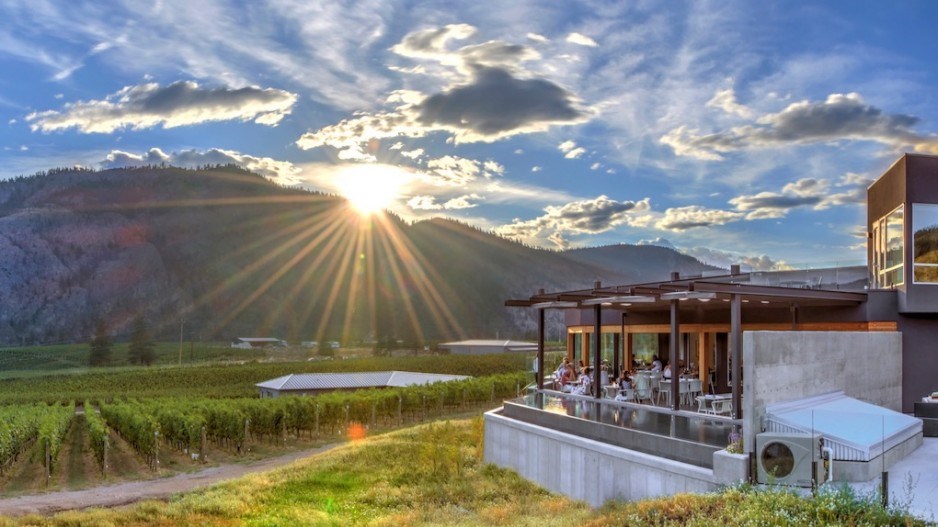B.C. wine entrepreneur Anthony von Mandl’s Iconic Wineries of British Columbia has bought Liquidity Wines Ltd. for $12.5 million, more than one of Liquidity’s 13 investors has told Business in Vancouver.
CEO Ian Macdonald and partners Dale Shwed and Jim Davidson launched the winery after buying the property in late 2008. They are the winery's three main investors. Among 10 smaller investors is Coastal Contacts founder Roger Hardy.
Ian Galbraith, who is a spokesman at von Mandl's Iconic Wineries of British Columbia confirmed the sale in an email but would not go into any details because, he said, "we are a private, family-owned company."
Macdonald told BIV that he had sought to buy grapes from von Mandl's companies, and that led to discussions that culminated in the transaction. He plans to stay with the company and he does not expect any immediate staffing changes.
"If I had my dream team for Liquidity to work with, it would be that group," he said in a phone call. "They have such skills and such resources, such passion around quality and about brand. That's really been a Liquidity story for us all along, even though we're small.... I couldn't be happier for the brand and for the future of the brand."
Iconic Wineries of British Columbia includes brands such as Mission Hill Family Estate Winery, CedarCreek Estate , Road 13 Vineyards, CheckMate Artisanal Winery and Martin's Lane Winery.
The profitable Liquidity Wines may be best known for its 2016 Reserve Chardonnay winning France’s Chardonnay du Monde gold medal in 2018 – an award that prompted the winery to tout the wine as the best Chardonnay in the world. Iconic Wineries of British Columbia has focused on trying to win global wine awards, as its Martin's Lane won the title of world's best Pinot Noir in the under £15 category at the Decanter World Wine Awards in 2013.
Von Mandl also owns Mark Anthony Group, which is a large company that rose to prominence for creating and producing Mike's Hard Lemonade. Von Mandl, however, sold Canadian rights to Mike's Hard Lemonade, Palm Bay, Okanagan Premium Ciders and Stanley Park Brewing to Labatt for $466 million in 2015. More recently he has overseen expanded sales for White Claw's line of spiked seltzers.
Liquidity Wines' sale comes as consolidation in B.C.’s wine sector has been ramping up. Land prices remain high and many winery principals are either reaching retirement age, dying or enduring divorces, according to B.C. wine author and industry observer John Schreiner. Some he said, just want to take money off the table.
He pointed to von Mandl last year buying Road 13. In 2014, he bought CedarCreek Estate Winery.
One of the largest batches of Okanagan winery purchases in recent years was in September 2017, when Andrew Peller Ltd. spent $95 million to buy Grey Monk Estate Winery, Tinhorn Creek Vineyards and Black Hills Estate Winery.
The Ontario Teachers' Pension Fund spent $1.03 billion in 2016 to buy Canadian wine assets from Constellation Brands Inc. (NYSE:STZ) – a transaction that included brands such as Sumac Ridge, Inniskillin, Black Sage Vineyard, Steller’s Jay, See Ya Later Ranch and a 49% stake in Nk’Mip Cellars. It then started buying other wineries, such as Laughing Stock Vineyards for an undisclosed amount in November 2017. It then bought Culmina Family Estate Winery last year.
Schreiner believes consolidation is a good thing.
"Given that there are 350 wineries in an area as small as B.C., yeah," he said.
He explained that when wineries become large, there can be money saved through economies of scale.
Running a winery that produces a few thousand cases is manageable for a husband-and-wife team, as most wine is sold either from the winery itself, or through a wine club. As production ramps up to between 5,000 and 10,000 cases or more, there needs to be various agents in Vancouver, Victoria or other cities, and this eats into profit. Larger conglomerates that already have large distribution networks are able to add a newly acquired winery to that distribution network with relatively little added cost, Schreiner said.
"The economics of wine in the Okanagan and the Similkameen [valleys] are not easy because the land cost for the most part is quite high," he said. "If you don't own or control a lot of your own vineyards, then you're buying grapes, and the grape prices have gone through the roof."
BIV in 2014 published a profile that traces Anthony von Mandl's path from being virtually penniless to being the head of a company that at the time had sales in the $500 million range. To read that, click here.




